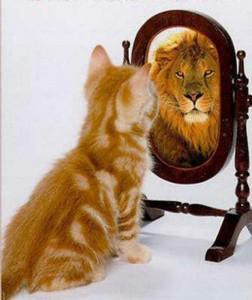
Confident, or delusional?
I’ve always been skeptical of high-energy, believe-in-yourself pitchmen. I think that, maybe unintentionally, they lead people into believing that success depends on having a big ego.
My take is that it’s a strong ego, not a big ego, that ultimately brings about success. They’re different things. To me, big egos feel brash, overbearing and boorish. Strong egos, on the other hand, believe they can make a difference, but they’re not cocky. They know they don’t have all the answers, and they know they have to do the work to be ready when opportunities come.
I was glad to see Tomas Chamorro-Premuzic address this idea last week in the Harvard Business Review blog. He discussed the idea that less confident people are more successful for three reasons:
- They pay attention to negative feedback, and they’re self critical. “To be the very best at anything,” he says, “you will need to be your harshest critic, and that is almost impossible when your starting point is high self-confidence.”
- They are motivated to work harder and prepare more. I heard Kurt Warner speak a couple of years ago, and he made the point that anyone who achieves great things pays the price of suffering and sacrifice. You simply can’t be great if you don’t put in effort. People who are overly self confident run the risk of feeling they’re already great, so they don’t have to do the work.
- They are less likely to come across as arrogant or deluded. They’re more likely to admit mistakes and to make sure that everyone gets credit for a job well done. Over time, they can achieve success not only for themselves but also for their organizations and their fellow workers.
In the first Star Wars movie, after Luke Skywalker blew up his first TIE fighter, Han Solo gave him a word of advice: “Great, kid. Don’t get cocky.” It’s good advice for all of us.
What do you think? Have we lost something by constantly talking up the need to be confident?

